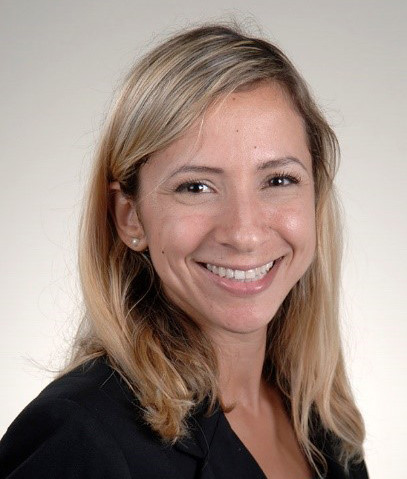Molinaroli College of Engineering and Computing
- SC.edu
- Study
- Colleges and Schools
- Molinaroli College of Engineering and Computing
- Faculty and Staff
- Camilla Ferreira Wenceslau
Faculty and Staff
Camilla Ferreira Wenceslau
| Title: | Associate Professor |
| Department: | Laboratory of Vascular Biology Cardiovascular Translational Research Center Cell Biology
and Anatomy Molinaroli College of Engineering and Computing |
| Email: | [email protected] |
| Office: | 4th Floor of Building 1 |
| Resources: | My Research Website |
 Follow @@WenceslauLab
Follow @@WenceslauLab
Experience and Education
- Associate Professor, University of South Carolina, Columbia, SC, 2021-Present
- Assistant Professor (tenure-track), University of Toledo College of Medicine, Toledo, OH, 2018-2021
- Postdoc, Physiology, Augusta University, medical College of Georgia, Augusta, GA., 2012-2018
- Ph.D., Human Physiology, University of Sao Paulo, Brazil, 2008-2012
- MS, Human Physiology, University of Sao Paulo, Brazil, 2005-2007
Research
The overarching goal of my laboratory is to understand vascular physiology in cardiovascular diseases. We study the mechanisms associated with the vascular-immune network in hypertension, metabolic syndrome and sepsis. Specifically, we question why immunoreceptors that are crucial for chemotaxis and inflammation in sentinel cells, are expressed in the vasculature? Further, does activation or inhibition of these receptors play a role in the vascular physiology and pathophysiology? To answer these questions, my laboratory employs a wide range of cutting-edge techniques and multidisciplinary in vivo and in vitro experimental approaches including clinically relevant diseased mouse and rat models, radiotelemetry, vascular isobaric and isometric force measurement, and biochemical and molecular biology methods. Our work has been previously supported by the American Heart Association (AHA) and it is currently funded by the NIH [NHLBI (R01) and NIGMS (R00)].
Selected Publications
- Edwards JM, Roy S, Galla SL, Tomcho JC, Bearss NR, Waigi EW, Mell B, Cheng X, Saha P, Vijay-Kumar M, McCarthy CG, Joe B, Wenceslau CF. FPR-1 (Formyl Peptide Receptor-1) Activation Promotes Spontaneous, Premature Hypertension in Dahl Salt-Sensitive Rats. Hypertension. 2021 Apr;77(4):1191-1202.
- Aradhyula V, Waigi E, Bearss NR, Edwards JM, Joe B, McCarthy CG, Koch LB, Wenceslau CF. Intrinsic exercise capacity induces divergent vascular plasticity via arachidonic acid-mediated inflammatory pathways in female rats. Vascul Pharmacol. 2021 Apr 16:106862.
- Joe B, McCarthy CG, Edwards JM, Cheng X, Chakraborty S, Yang T, Golonka RM, Mell B, Yeo JY, Bearss NR, Furtado J, Saha P, Yeoh BS, Vijay-Kumar M, Wenceslau CF. Microbiota Introduced to Germ-Free Rats Restores Vascular Contractility and Blood Pressure. Hypertension. 2020 Dec;76(6):1847-1855.
- Roy S, Edwards JM, Tomcho JC, Schreckenberger Z, Bearss NR, Zhang Y, Morgan EE, Cheng X, Spegele AC, Vijay-Kumar M, McCarthy CG, Koch LG, Joe B, Wenceslau CF. Intrinsic Exercise Capacity and Mitochondrial DNA Lead to Opposing Vascular-Associated Risks. Function (Oxf). 2021;2(1):zqaa029. doi: 10.1093/function/zqaa029. Epub 2020 Nov 3.
- Edwards JM, Roy S, Tomcho JC, Schreckenberger ZJ, Chakraborty S, Bearss NR, Saha P, McCarthy CG, Vijay-Kumar M, Joe B, Wenceslau CF. Microbiota are critical for vascular physiology: Germ-free status weakens contractility and induces sex-specific vascular remodeling in mice. Vascul Pharmacol. 2020 Feb-Mar;125-126:106633.
Teaching
- Lecture: Vascular Signaling; Biomedical Science Program.
- Lecture: Regulation of Vascular signaling and Migration; Biomedical Science Program.
- Lecture: “Vascular Sepsis”; Biomedical Science Program.
Awards and Honors
- The John Laragh Research Award, 2020 - The American Journal of Hypertension (https://academic.oup.com/ajh/pages/john_laragh_research_award )
- Fellow of the AHA (FAHA) Council on Hypertension
- International Society of Hypertension, Spotlight of the month (http://ish-world.com/new-investigators-spotlight/i/April-2017-spotlight-of-the-month/ )
- NIH Pathway to Independence Award (K99/R00)
- Research Recognition Award - Cardiovascular Section - The American Physiological Society (APS).